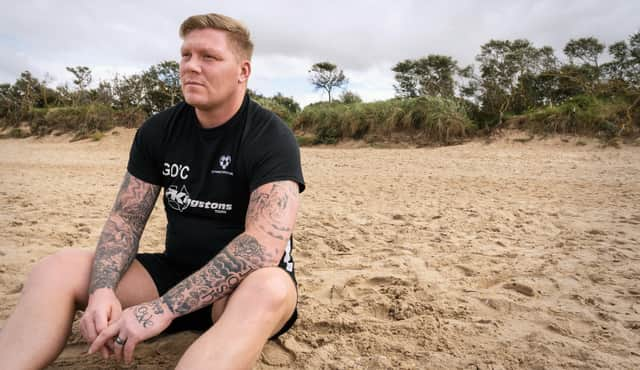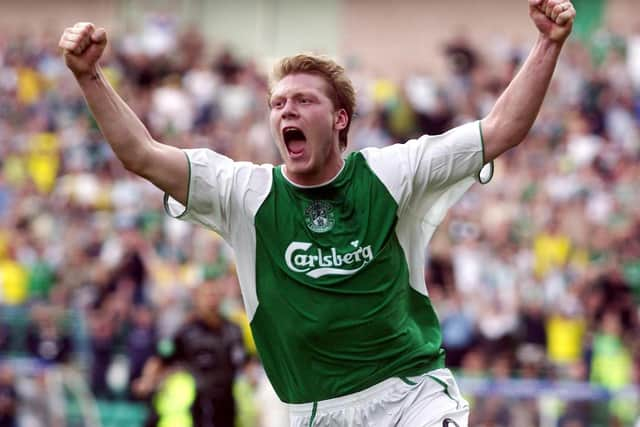Garry O’Connor: I feel I could have achieved a bit more


Although it includes tales of the kind of japes expected from young tyros living the dream at their favourite football club, the Garry O’Connor story can begin to feel very cheerless.
“It is a sad, sad story,” reflects John Hughes, who was the victim of one prank involving O’Connor and best friend Derek Riordan. They somehow commandeer the keys to his car and drive to Hughes’ home, parking it outside his door. Not much good to Hughes, who was still at Easter Road. “Joy riding basically,” says O’Connor, the subject of a half hour documentary going out next week as part of the Playing the Game series on BBC Scotland.
Advertisement
Hide AdAdvertisement
Hide AdWhat a trip. From the old mining village of Port Seton to Selkirk, via Moscow, Birmingham, Barnsley, Greenock and two spells at Hibs. But there wasn’t always a lot of joy. Certainly, not as much as you might expect given O’Connor was earning £20,000 a week when he was just 23 after moving to Lokomotiv Moscow, for whom he scored the winner in the 2007 Russian Cup final.


“I feel I could have achieved a bit more, but no-one can take they memories away from me. Life is what it is, you have to move on,” says O’Connor as he reflects on his career while sitting on a beach in East Lothian towards the end of the documentary and shortly before admitting he had considered suicide.
He is still only 37 but it’s a long time since he operated as a footballer. His career was all but over by the time he hit 30. He regrets not making a better fist of one last final-chance at Morton.
Many things have been said about O’Connor, some genuinely insulting. He was ridiculed as being so thick he could not even spell his own name, such as the time he was apprehended by police in Edinburgh and apparently forgot the second r in Garry when asked for his details. That’s not the O’Connor that the programme’s director and editor, the East Lothian-raised Vito Milazzo, grew to know and like. And nor is it the figure producer Sinead Kirwan will recall. “The first time I met Garry was while we were filming the teaser – the BBC wanted to see how he was on camera,” says Milazzo.
“Sinead had previously worked on a miners’ strike documentary. And there was Garry chatting to Sinead about the miners’ strike and Thatcherism. Not something you would necessarily be prepared for if the only things you knew about Garry were from a Google search or the tabloids.”
He once paid £150,000 for a Ferrari in cash but only put 500 miles on the clock. The sense of waste is everywhere in this short – too short – but informative and, importantly, educational film. It’s also revelatory in places.
A sense of sadness pervades early on. O’Connor recounts his days as a budding footballer. His mother and father were out working so his uncle Mark was a surrogate parent who took him to training. “He was always there to put a foot up my bum basically, he was always pushing me forward,” he recalls.
Mark was killed when O’Connor was only 14 after being hit by a drunk driver. O’Connor wonders whether he might have followed some of the paths taken had his uncle been there to guide him.
Advertisement
Hide AdAdvertisement
Hide AdMentors – or the absence of mentors – is a recurring theme. He suffers for it in Russia first time around (he returns for an ill-fated spell at Siberian club Tom Tomsk). There was no Tony Mowbray, no Alex McLeish. And there was no – this might shock a few people – Rod Petrie. The chairman stuck his neck out for O’Connor after Colin Calderwood brought the troubled striker back to Hibs in 2011.
“One story which does not make it in is that Rod Petrie held a fans’ event shortly after Garry re-signed,” recalls Milazzo. “Some fans were barracking him because Garry at that time was known for substance abuse issues. And Rod broke down in his defence and promised he would come good. And, in a sense, he did.”
His scoring rate – 16 goals in 40 appearances – was better than in his first spell. This goal touch deserted him when it mattered in the Scottish Cup final at the end of the season, when Hibs lost 5-1 to Hearts and O’Connor, at the post-match wake at Easter Road, fell off the wagon again.
Petrie struck up a personal connection with O’Connor. After all, his transfer fee helped pay for the construction of the club’s new training ground at East Mains.
O’Connor was on his uppers after a spell on loan at Barnsley expired and he was released by Birmingham. It later emerged he had failed a drugs test having used cocaine to try and ward off depression as he battled to regain his form after injury.
There’s no question he wasted a lot of money – his monthly outgoings, he reveals, totalled as much as £60,000 long after he had stopped earning anything like that kind of money. He downsized in every way but his weight and moved into a council house.
The series’ title, Playing the Game, is chosen advisedly.
“We want to try and let people understand that these guys are not just playing the game,” explains Milazzo. “Hopefully this helps towards a reckoning so football learns to deal with the consequences of asking these guys to play at a high level and have their lives revolve around 90-minute stretches without realising a footballer’s life encompasses so much more than that.”
The film ends on a hopeful note. The absence of a mentor is not something Josh, O’Connor’s talented 16-year-old son, will lament. He is currently at Hibs, where great things are expected of him.
Advertisement
Hide AdAdvertisement
Hide Ad• Playing the Game: Garry O’Connor is being shown on BBC Scotland on Tuesday at 10pm.
A message from the Editor:
Thank you for reading this story on our website. While I have your attention, I also have an important request to make of you.
With the coronavirus lockdown having a major impact on many of our advertisers - and consequently the revenue we receive - we are more reliant than ever on you taking out a digital subscription.
Subscribe to scotsman.com and enjoy unlimited access to Scottish news and information online and on our app. With a digital subscription, you can read more than 5 articles, see fewer ads, enjoy faster load times, and get access to exclusive newsletters and content. Visit https://www.scotsman.com/subscriptions now to sign up.
Our journalism costs money and we rely on advertising, print and digital revenues to help to support them. By supporting us, we are able to support you in providing trusted, fact-checked content for this website.
Joy Yates
Editorial Director
Comments
Want to join the conversation? Please or to comment on this article.